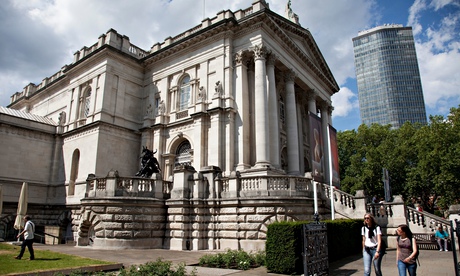
The protests have included a ‘mass exorcism’ in Tate Modern’s Turbine Hall, gallons of oily black molasses ‘accidentally’ split at Tate’s annual summer party, and transcripts of the Deepwater Horizon trial whispered accusingly round the galleries – yet through it all, Tate has stood by its longest-running and most controversial sponsor, the oil company BP.
On Monday, the primary reason why was revealed. Tate figures, released after a three-year legal battle showed for the first time how much money BP donated over a 17-year period. The total was £3.8m, given in annual amounts varying between £150,000 and £330,000 – an average of £224,000 a year. A “considerable sum” say Tate. An “embarrassingly small” figure, counter the protesters.
The revelation, which comes after Tate lost at a freedom of information tribunal, put into the spotlight BP’s sponsorship of the arts which continues with a deal in place until 2017 giving £10m over five years to four national institutions: Tate, the National Portrait Gallery, the British Museum and the Royal Opera House.
All four say it is money that they need and that other corporations are not willing to provide. The writer and cultural sociologist Tiffany Jenkins said they were not insignificant amounts when public money for the arts was declining.
But she added: “The figures are smaller than they should be. BP has a lot of money and Tate is an important gallery and it would be nice if BP gave more. Tate should be asking for more.
“I have no problem with oil companies, we need them. I’m suspicious of this notion that the arts needs to be ethically funded. These are difficult times for the arts and they need the money.”
Others argue that taking the money is wrong on all levels. Raoul Martinez, an artist whose work has been exhibited at the BP Portrait prize, said he has now decided to not enter the competition again while the oil firm is the sponsor.
He said it was wrong for Tate to take the money given “BP’s horrendous environmental record, and their role in obfuscating climate science and slowing down a meaningful response to climate change – the greatest threat to humanity’s continued survival.
“Tate’s reaction to this criticism has been stubborn foot-dragging. And for what? A tiny percentage of their annual budget? It’s highly embarrassing for Tate, and should result in a decisive change of course.”
Brendan Montague of the campaign group Request Initiative made the original freedom of information request in April 2012. Anna Galkina of Platform, another activist group involved in the case, said the eventually released figures were lower than they had estimated.
She added: “For nearly a decade, Tate provided a veneer of respectability to one of the world’s most controversial companies for [as little as] £150,000 a year. The figures are embarrassingly small for Tate to go on justifying its BP relationship.”
Galkina said BP gets far more out of the relationship than Tate, and needs the social licence provided by cultural sponsorship “in order to continue trashing our climate.
“Tate can clearly do without BP. A growing wave of universities, faith and government institutions are choosing to divest and break ties with the fossil fuel industry – it’s time for Tate to join them.”
Platform estimates that the BP sums of money represent 0.5% of Tate’s overall operational income
Tate said the figures represented “considerable funding.” It added: “BP is one of the most important sponsors of the arts in the UK supporting Tate as well as several other leading cultural institutions.
“Tate works with a wide range of corporate organisations and generates the majority of its funding from earned income and private sources. The support that these organisations give is extremely important and allows us to deliver a hugely successful and popular programme.
“The Tate trustees first agreed a sponsorship policy in 1991, and more recently incorporated its principles within an ethics policy in 2008. The board and ethics committee regularly review compliance with the policy.
“BP has worked with Tate since 1990 and fits within the guidelines of this policy. Its support has been instrumental in helping Tate develop access to the Tate collection and to present changing displays of work by a wide range of artists in the national collection of British art.”
As well as the figures, Tate also released considerable and previously unseen detail from the minutes of the ethics committee, which debated in 2010 whether to continue with BP sponsorship.
They show that BP’s controversial interests in the Canadian oil sands and the Gulf of Mexico disaster of 2011 were discussed but, ultimately, “taking a moral stance on the ethics of the oil and gas industry remains outside of Tate’s charitable objectives”.
The committee, whose members included the artist Jeremy Deller, agreed with the executive view that “currently the benefits of BP’s support for Tate far outweigh any quantifiable risk to our reputation”. Tate revealed the figures after being given a 35-day deadline by an information tribunal in December.
Rosa Curling, a solicitor with the firm Leigh Day, which has been working free of charge on the case, said she hoped Tate would change its approach and operate in a more transparent manner when it comes to corporate sponsorship.
“Tate has fought and no doubt spent a large amount of money trying to keep this information secret,” she said. “If public bodies are accepting sponsorship money from corporations such as BP, they must be open about how much they are receiving. Tate’s actions have prevented proper public debate over the acceptability of the sponsorship, based on actual figures, for more than three years.”
For its part Tate pointed to the fact that the tribunal had upheld many of Tate’s redactions and had commended the organisation for “being thorough and open” in its approach to the case.

